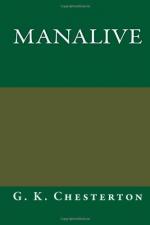“`I don’t deny,’ he said, `that there should be priests to remind men that they will one day die. I only say that at certain strange epochs it is necessary to have another kind of priests, called poets, actually to remind men that they are not dead yet. The intellectuals among whom I moved were not even alive enough to fear death. They hadn’t enough blood in them to be cowards. Until a pistol barrel was poked under their very noses they never even knew they had been born. For ages looking up an eternal perspective it might be true that life is a learning to die. But for these little white rats it was just as true that death was their only chance of learning to live.’
“His creed of wonder was Christian by this absolute test; that he felt it continually slipping from himself as much as from others. He had the same pistol for himself, as Brutus said of the dagger. He continually ran preposterous risks of high precipice or headlong speed to keep alive the mere conviction that he was alive. He treasured up trivial and yet insane details that had once reminded him of the awful subconscious reality. When the don had hung on the stone gutter, the sight of his long dangling legs, vibrating in the void like wings, somehow awoke the naked satire of the old definition of man as a two-legged animal without feathers. The wretched professor had been brought into peril by his head, which he had so elaborately cultivated, and only saved by his legs, which he had treated with coldness and neglect. Smith could think of no other way of announcing or recording this, except to send a telegram to an old friend (by this time a total stranger) to say that he had just seen a man with two legs; and that the man was alive.
“The uprush of his released optimism burst into stars like a rocket when he suddenly fell in love. He happened to be shooting a high and very headlong weir in a canoe, by way of proving to himself that he was alive; and he soon found himself involved in some doubt about the continuance of the fact. What was worse, he found he had equally jeopardized a harmless lady alone in a rowing-boat, and one who had provoked death by no professions of philosophic negation. He apologized in wild gasps through all his wild wet labours to bring her to the shore, and when he had done so at last, he seems to have proposed to her on the bank. Anyhow, with the same impetuosity with which he had nearly murdered her, he completely married her; and she was the lady in green to whom I had recently said `good-night.’
“They had settled down in these high narrow houses near Highbury. Perhaps, indeed, that is hardly the word. One could strictly say that Smith was married, that he was very happily married, that he not only did not care for any woman but his wife, but did not seem to care for any place but his home; but perhaps one could hardly say that he had settled down. `I am a very domestic fellow,’ he explained with gravity, `and have often come in through a broken window rather than be late for tea.’




